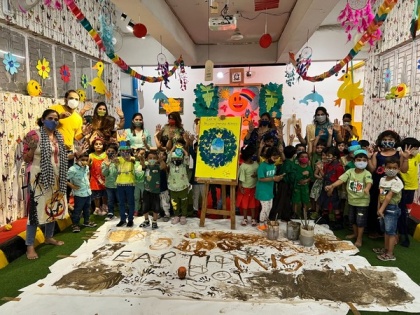Delhi-based Modern International School celebrates Earth-Water-Air month
By ANI | Updated: May 9, 2022 14:40 IST2022-05-09T14:32:23+5:302022-05-09T14:40:08+5:30
One of the city's most esteemed schools, the Modern International School, Sector 19, Dwarka, New Delhi celebrates 'important' national and international days with great enthusiasm as it is an opportunity to spread awareness and educate their children about critical causes and issues.

Delhi-based Modern International School celebrates Earth-Water-Air month
One of the city's most esteemed schools, the Modern International School, Sector 19, Dwarka, New Delhi celebrates 'important' national and international days with great enthusiasm as it is an opportunity to spread awareness and educate their children about critical causes and issues.
In line with this, the school celebrated April month as EWA (Earth-Water-Air) Festival month by organising awareness for climate change and global warming.
Sima J. Singh, Principal of Modern International School, said, "As 22 April is Earth Day, and by celebrating Earth Day, we're part of a community of over 1 billion people who take part in this every year. But teaching kids on a single day about the earth and climate changes can't make any changes so we decided to celebrate April month as EWA (Earth-Water-Air) Festival month."
While celebrating this month, kids have learnt a lot about climate change. Teachers help them understand the science behind climate change, the impacts of a changing climate, and how they can help slow climate change and prepare for it. Students have learnt about many topics including Climate, Global Warming, Green House Effect, Carbon Dioxide, Carbon Footprint, fossil fuels and many more.
Dr Gaurav Nigam, Director of Modern International School & MD Paediatric, said, "Our environmental problems don't start at the individual level, but we want to educate students to show them that they can live cleaner lives pretty easily by recycling, understanding your carbon footprint and finding ways to repurpose and reuse items."
Teaching everything to every student is not possible with ages ranging from 3 years to 15 years. Hence, all the teachers had prepared these topics according to kids' level. Since younger children won't easily understand concepts such as greenhouse gases and ocean acidification, the teachers started out with a more straightforward message: Living things grow and thrive when we care for them. Children learn through doing so teachers created activity-based awareness programs for younger kids. On Earth Day, 22 April, the school's 3 and 4-year kids created a huge painting on canvas using different types of soil, water, dry grasses and leaves as a pledge and commitment to save the earth. At the same time, primary students celebrated earth day by planting trees and taking pledges to take care of it every day.
Dr Priya Mathur, Director of Modern International School, said, "Our main aim was to inspire students to make a difference so we planned to discuss the basic facts, answer tough questions, and help kids cope with climate anxiety--even when we, too, are feeling overwhelmed."
The purpose of holding the EWA Festival events was not only to educate students on the environment but also to bring students together during the busy time of the year for some fun and relaxing activities that highlighted the importance of environmental awareness. All the events focused on aspects of sustainability, nature or simple actions people can implement to create an eco-friendlier lifestyle.
Sima J. Singh further added, "The goal is environmental education, to connect people with things they can do. The topics we teach have a lot of macro ideas about how we make society more sustainable and how we combat climate change."
Climate issues are systemic, and they cannot be solved simply by individuals implementing changes to their lives; however, it makes a difference and can direct humans towards more significant changes. These activities lead students to see the connections between human and natural systems while building positive community actions and recognizing that macro-level changes are necessary to create lasting changes.
To know more, visit -
This story is provided by SRV.will not be responsible in any way for the content of this article. (ANI/SRV)
( With inputs from ANI )
Disclaimer: This post has been auto-published from an agency feed without any modifications to the text and has not been reviewed by an editor
Open in app